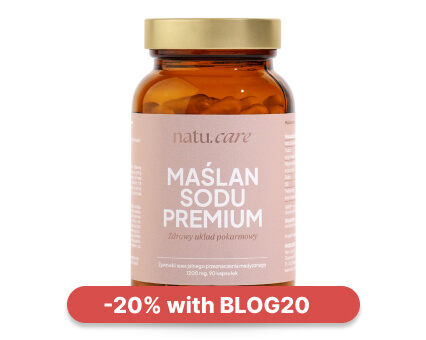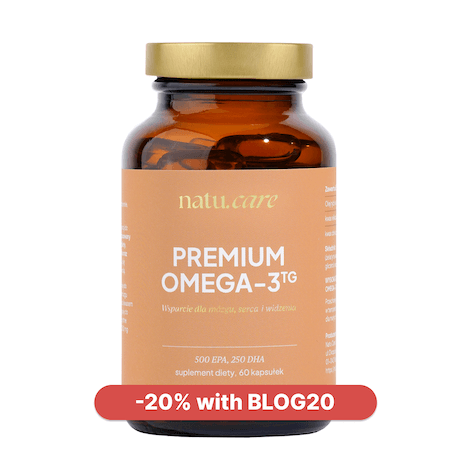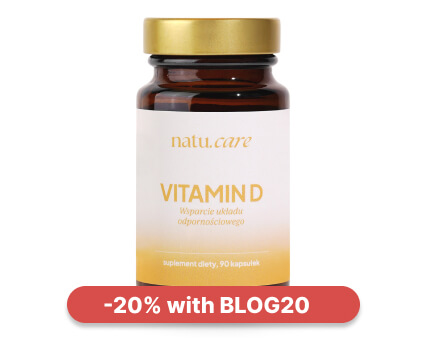Caffeine - a natural stimulant: properties, dosage and sources
Caffeine - the legal psychoactive agent in your favourite little black.


Learn more about our editorial process
.

Learn more about our editorial process
.

Learn more about our editorial process
.

Learn more about our editorial process
.
Why you can trust us
Articles on Natu.Care are written based on scientific research, data from government websites and other reliable sources. The texts are written in cooperation with doctors, nutritionists and other health and beauty experts. Articles are reviewed before publication and during significant updates.
.Learn more about our editorial process
.Information about advertisements
Content on Natu.Care may contain links to products from the sale of which we may receive a commission. When creating content, we adhere to high editorial standards and take care to be objective about the products discussed. The presence of affiliate links is not dictated by our partners, and we select the products we review ourselves completely independently.
.Learn more about our terms and Conditions
.Caffeine is a natural psychoactive agent - I know, it sounds corny, but it helps many people start the day at work, cram knowledge the night before a session or make lives on a workout.
Caffeine consumption has many health benefits, but it doesn't take much to make a crash out of arousal. I have co-written about what caffeine gives and how to find the balance in its use with Ilona Krzak, MSc in pharmacy.
From this article you will learn:
.- What caffeine is and how it works. .
- What are the benefits of using caffeine. .
- What is the safe dosage of caffeine. .
- Whether caffeine is addictive. .
- What are the common sources of caffeine. .
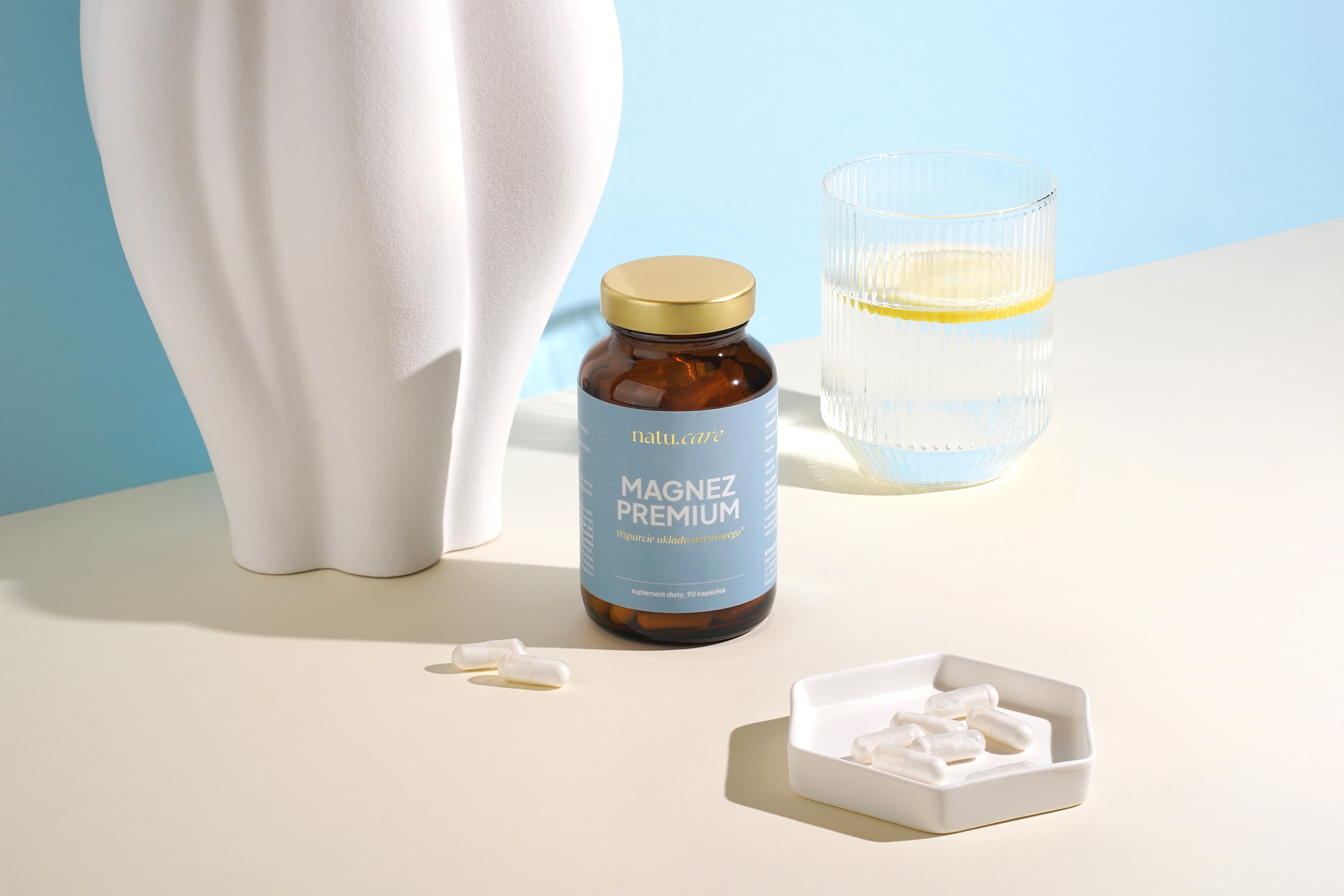
Sprawdź, co połączenie magnezu i witaminy B6 może zrobić dla Twojego zdrowia!
Natu.Care Magnez Premium + Witamina B6
Wesprzyj prawidłowe funkcjonowanie układu nerwowego, krwionośnego i mięśniowego dzięki synergicznemu działaniu magnezu i witaminy B6. Odkryj pełnię korzyści dla Twojego zdrowia każdego dnia!
Sprawdź cenę
Magnez Premium przyjmuję już od 2 miesięcy i naprawdę czuję się znacznie lepiej. Mam więcej energii, przestałam mieć skurcze i nie denerwuję się już tak szybko, co w przypadku bycia mamą – bywa wyzwaniem!@DianaW.
Caffeine - what is it?
.
Caffeine (English caffeine) is an organic chemical compound from the alkaloid group that is found in coffee and cocoa beans, kola nuts and tea leaves, among others. It is classified as a stimulant because it has a stimulating effect on the central nervous system (CNS)and.
Stimulants increase activity in certain areas of the brain, leading to an increase in concentration, attention and energy and a reduction in fatigue. Caffeine is therefore a natural psychoactive agent, but it can also be obtained by chemical synthesisand.
.
Caffeine blocks selected adenosine receptors, causing the release of neurotransmitters e.g. dopamine, serotonin and glutamate. Their elevated concentrations result in, among other things, stimulation of the nervous system, vasodilation of blood vessels and acceleration of the heart rate.
It is used as an additive in some products, including energy drinks, pre-workout drinks, medications or dietary supplements.
History lesson
Already in the Stone Age, people noticed that chewing the seeds or leaves of certain plants had a stimulating effect, improving performance and attentiveness. Much later, humans realised that they could increase their effectiveness by immersing the ingredients in hot waterand. We have come a long way - from chewing leaves, to the ritual of yerba, to the pumpkin spice latte.
Is caffeine a ... drug?
.
Yes, caffeine is a drug because it belongs to the group of stimulants, that is, psychoactive substances that act mainly as a stimulant by affecting the activity of the sympathetic or central nervous systemand.
.
In society, there is an informal division between psychoactive substances acceptable (e.g. caffeine, nicotine or alcohol) and unacceptable (e.g. cocaine, heroin or amphetamines) - but all meet the criteria for belonging to this group.
Of course, caffeine differs in its effects and side-effects from heroin, but it is impossible to disavow their common classification. This, however, is a separate topic that is best discussed over... small black.
Caffeine - chemical formula
.
The chemical formula of caffeine is C₈H₁₀N₄O₂. It was discovered in 1819 by German chemist Friedrich Ferdinand Rungeand. Caffeine is found in many popular products and chemically it is the same substance, although called by a different name.
Caffeine is otherwiseand:
- theine - from tea, .
- matein - from yerba mate, .
- guaranine - from guarana, .
There are some differences in its effects on the body depending on the source. These are due to the amount and the presence of other substances with which it is consumedand.
Magister of Pharmacy adds:
Caffeines inactivate caffeine. You can taste them in very strong, concentrated tea - it's bitter, astringent. The longer the tea is brewed, the more tannins are released.
If you want a refreshing, stimulating drink, then stick to the rule of thumb to brew for no longer than 3 minutes..
 .
.
Ilona Krzak Master of Pharmacy
.
Caffeine versus caffeine anhydrous
.
The primary difference between caffeine and anhydrous caffeine is that the latter is a pure, concentrated form of caffeine, whereas 'regular' caffeine is usually consumed in its natural form, such as in drinksand.
Caffeine anhydrous is obtained in laboratories through processes such as water filtration. The result is a white, crystalline powder with a highly concentrated caffeine content. Thanks to this processing, manufacturers of medicines or dietary supplements can specify its dosage more precisely in capsules or powder.
Caffeine is used in the manufacture of medicines. You will find it in painkillers or cold preparations, for example. It acts as a supportive agent to make the medicine work more effectively..
 .
.
Ilona Krzak Master of Pharmacy
Caffeine can also be found in preparations for the treatment of migraine, apnoea, hypotension, and the prevention and treatment of bronchopulmonary dysplasia in premature infants - adds MSc pharmacist.
The following is an example.
Metabolism of caffeine
.
Caffeine is absorbed in the body within 45 minutes, and its blood levels peak within 15-45 minutes of ingestionand. It is assimilated in the small intestine and then metabolised in the liver.
The duration of caffeine's effect depends on the source (e.g. caffeine in capsules or powder will be absorbed more quickly than from black tea) the dose, age, body weight and a person's sensitivity to the substance .
When absorbed, caffeine rapidly enters all tissues of the body and also crosses the blood-brain, blood-placental and blood-nuclear barriers..
 .
.
Ilona Krzak Master of Pharmacy
Dangerous dry scooping
.Dry scooping involves taking a portion of caffeine powder directly into the mouth, rather than dissolving it in water. This is dangerous because anhydrous caffeine is easy to overdose on, the powder can be difficult to swallow and can enter the lungs and nostrils through coughing. A teaspoon of caffeine powder can be equivalent to 28 cups of coffeeand.
.
Caffeine - properties
.
Caffeine has been shown to have many beneficial properties, such as increasing concentration, adding energy, improving reflexes and even increasing metabolic rate. Thanks to its ability to constrict blood vessels, it can also alleviate migraine painand.
What exactly does the scientific research suggest?
.
Promotes cognitive function
.
Caffeine benefits cognitive functionand:
.
- .
- improves alertness and concentration, .
- reduces sleepiness during mental fatigue, .
- supports accuracy, reasoning, memory, reaction time, attention, .
- can improve some aspects of cognitive function that have been impaired by sleep deprivation, .
Caffeine acts mainly in the central nervous system, where it prevents adenosine from binding to its receptor, which affects the secretion of several neurotransmitters, e.g. norepinephrine, dopamine, serotonin, which are involved in, among other things, alertness, motivation, memory.
Caffeine has a positive effect on the release of several neurotransmitters, e.g. norepinephrine, dopamine, serotonin, which are involved in, among other things, alertness, motivation, memory.
Drinking 3-5 cups of coffee a day or more than three cups of tea a day can reduce the risk of neurodegenerative conditions such as Alzheimer's and Parkinson's disease by 28-60%and.
Improves wellbeing
.
Research suggests that consumption of 200 to 250 mg of caffeine improves mood,This effect can last up to 3 hours .
A meta-analysis of 12 studies published in 2015 found that drinking coffee or tea regularly reduces the risk of depression by 13% . Another review of studies linked drinking 2-3 cups of coffee (200-300 mg of caffeine) per day with a 45% lower risk of suicideand.
Coffee is a treasure trove of antioxidants and bioactive compounds that also have a mood-boosting effect, and caffeine has a part to play in this - in a reasonable dose, of course. Bear in mind that higher doses (>600 mg per day) can increase tension or anxiety and exacerbate unpleasant symptoms such as an accelerated heartbeatand.
Influences metabolism and fat burning
.
Caffeine is a popular ingredient in many weight-loss supplements or so-called burners. This is because its effects look promising in scientific studies.
.
Caffeine can increase metabolism by up to 11% and fat burning by up to 13%and. It also increases resting metabolism - in practice, this means that consuming around 300 mg of caffeine a day can allow you to burn an extra 79 calories - as much as a ball of Raffaello.
Interestingly, this effect is less pronounced in obese or elderly peopleand. One study found that caffeine increased fat burning by as much as 29% in slim people and 10% in obese people .
Everything counts
.Caffeine increases the release of neurotransmitters such as dopamine and norepinephrine, which in turn makes you feel more energised and awake. You're more willing to take the stairs instead of using the lift, and you stomp along to your favourite music. It all burns kilocalories.
Caffeine increases basal metabolism, meaning you burn more kcal even when you're not moving, but these are such low amounts that don't expect spectacular results - it won't do itself.
See also:
.
Reduces appetite
.
Hunger and appetite are controlled by complex systems in your body, which can be heavily influenced by what you eat and drink. Research suggests that caffeine intake 0.5-4 hours before a meal can affect gastric emptying rates, appetite hormones and feelings of hungerand.
Maybe you're thinking that this is then a great idea for weight loss support. And yes, and no. If you want to lose weight, drinking coffee can indeed help you and suppress hunger. Consuming it between meals can influence you to want to eat less.
However, having coffee for breakfast instead of a meal or consuming it when you already feel a strong hunger is a bad idea. Sooner or later physiology will win out and you will simply eat, even more than you plannedand and... you may develop heartburn.
Coffee increases gastric juice secretion and can cause heartburn in some people..
 .
.
Ilona Krzak Master of Pharmacy
.
Provides energy and improves sports performance
.
It's said that you make two kinds of lifetimes in life: those on caffeine and those without. That says a lot about the powerful effect it has on improving performance, strength and overall athletic performance.
Caffeine is a popular ingredient in so-called pre-workout supplements (PWRs), i.e. formulations containing combinations of active ingredients that exert an increase in energy, strength and performance during training.
The World Anti-Doping Agency (WADA) removed caffeine from its list of banned substances in January 2004 and moved it to a so-called monitoring programme.
 .
.
Ilona Krzak Master of Pharmacy
Caffeine may increase the use of fat as fuel, which may affect longer glucose storage in muscle, potentially delaying the time at which muscle reaches exhaustionand.
A review of studies involving a total of 202 people found that caffeine can increase fatigue tolerance and reduce perceived exertion during exercise by up to 5.6% .
.Eat caffeine
.A 2023 study involving young, trained individuals found that chewing gum with 200 mg of caffeine 15 minutes before a workout had a beneficial effect on performing the Romanian deadlift compared to a placebo. Caffeine increased total work (+7%), average power (+12%) and strength (+22%)and.
See also:
.Promotes the cardiovascular system
.Many scientific studies highlight that moderate caffeine consumption benefits cardiovascular healthand.
Drinking 1-4 cups of coffee per day (i.e. 100-400 mg of caffeine) can reduce the risk of heart disease in men and women by 16-18% . Other studies show that drinking 2-4 cups of coffee or green tea per day is associated with a 14-20% lower risk of strokeand.
A comprehensive review of 26 scientific studies found that people who regularly consume caffeine have up to a 30% lower risk of diabetesand. The authors observed that the risk drops by 12-14% for every 200 mg of caffeine consumed.
Remember that green tea and coffee also contain many other bioactive ingredients that also contribute to this health benefit - it is not caffeine alone. That's why it's a good idea to choose natural sources of it instead of tablets or capsules with pure caffeine.
Coffee has been linked to a likely reduced risk of breast, colorectal, colon, endometrial and prostate cancer.
.
 .
.
Ilona Krzak Master of Pharmacy
.
Caffeine and pain
.The scientific research on this topic is inconclusive. On the one hand, caffeine can cause migraines and headaches, as well as being a cure for themand. Researchers suggest that caffeine should be controlled on a daily basis, and migraine sufferers should limit their intake to 200 mg/day .
Natu.Care Collagen Premium 5000 mg, mango & passion fruit

- Collagen content: 5000 mg marine collagen hydrolysate
- Additional active ingredients: vitamin C, low molecular weight hyaluronic acid (and L-theanine and coenzyme Q10 in cocoa flavoured collagen or vitamin A and vitamin E in mango–passion fruit flavoured collagen)
- Form: powder sachets
- Dose: 1 sachet per day
- Sufficient for: 30 days
Product description
Fish collagen from the Natu.Care brand in a dose of 5000 mg, based on certified ingredients of the best quality. Regular supplementation will positively influence the appearance of the skinóry, hairów and nails – they will be rebuilt and strengthened from the inside.
In addition to collagen, which is valuable for health and beauty, it also offers other active ingredients that help to maintain a youthful complexion, shiny hair and strong nails.
The formula contains a sufficient portion of the active ingredient to positively affect joints, the musculoskeletal system and immunity.
Natu.Care Premium Collagen is available in two flavours – Cacao Bloom and Rise&Shine. Both formulas are based on the following active ingredients: marine collagen hydrolysate, wild roseóbud extract and hyaluronic acid.
Additionally, Cacao Bloom contains natural L-theanine, coenzyme Q10 and defatted Dutch cacao. Rise&Shine instead contains vitamin E and vitamin A.
These are the best collagens in the world.
These best fish collagens on the market also rós taste – Cacao Bloom is a treat for chocolate lovers. Rise&Shine will appeal to those whoólike the refreshing taste of mangoófruit and passion fruit.
Pros and cons
Pros:
- Vitamin C supports the body's collagen production, enhancing its effectiveness.
- An effective dose of hyaluronic acid, which additionally supports skin hydration and joint health.
- Fish collagen absorbs 50% better. Additionally, the manufacturer specifies the fish species it is sourced from (Atlantic cod).
- The composition has been tested by the independent and accredited J.S. Hamilton laboratory.
- MSC (Marine Stewardship Council) quality certification, which confirms that the collagen source supports sustainable fishing practices.
Cons:
- None.
Additional information
Natu.Care's fish collagen receives praise for its delicious taste. You won't find the fishy aftertaste that often comes through in other collagens. Plus, you have two tasty flavors to choose from: cocoa and mango-passionfruit.
Active ingredients like coenzyme Q10, hyaluronic acid, and natural L-theanine provide anti-inflammatory and antioxidant benefits while slowing down aging processes.
User review
Super, after about 6 weeks of use, the skin on my face became noticeably firmer. Wonderful taste.
Ania ZalewskaNatu.Care customer
Natu.Care Premium collagen 10 000 mg, mango-maracuja
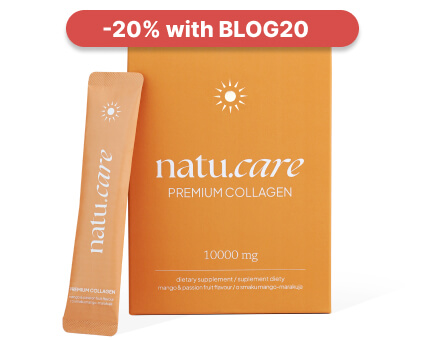
- Collagen content: 10,000 mg marine collagen hydrolysate
- Additional active ingredients: vitamin C, low molecular weight hyaluronic acid (and L-theanine and coenzyme Q10 in cocoa flavoured collagen or vitamin A and vitamin E in mango–passion fruit flavoured collagen)
- Form: powder sachets
- Dose: 1 sachet per day
- Sufficient for: 30 days
Product description
One of the strongest collagens on the market, whichós provides as much as 10,000 mg in a daily serving. This allows the formula to effectively support the condition of the skin, hair and nails.
With this supplement, you will support your beauty, which will allow you to visually stop the ageing process and feel a second youth!
Natu.Care Collagen Premium 10 000 mg comes in two flavours – cherry and mango-maracuja. Both formulas have the same product backbone – collagen, hyaluronic acid and vitamin C.
In the cherry version you additionally find glucosamine, chondroitin and Indian frankincense resin extract. Mango-maracuja, on the other hand, contains vitamin E and vitamin A.
Pros and cons
Pros:
- Tested collagen formula – SeaGarden, whose effects have been confirmed in clinical studies.
- Effective dose of hyaluronic acid, additionally moisturizing the skin and positively impacting joint health.
- Vitamin C supports the body’s natural collagen production.
- The composition has been tested by the independent and accredited J.S. Hamilton laboratory.
- The product has an MSC (Marine Stewardship Council) quality certification – the collagen source supports sustainable fishing practices.
Cons:
- None.
Additional information
Users praise Natu.Care Collagen Premium for the easy dissolvability of the powder.
User review
I noticed a significant improvement in my skin texture after a few weeks of taking collagen regularly. My complexion is now as soft as velvet!
Natu.Care Collagen Premium 10000 mg, cherry

- Collagen content: 10,000 mg of hydrolyzed bovine collagen
- Additional active ingredients: vitamin C, low molecular weight hyaluronic acid, glucosamine, chondroitin, extract of Indian frankincense resin (boswellia serrata)
- Form: powder sachets for drinking
- Serving: 1 sachet per day
- Lasts for: 30 days
Product description
One of the strongest collagens on the market, providing as much as 10,000 mg per daily serving. This product can effectively support the condition of joints, skin, hair, and nails.
With this supplement, you will support your skeletal and joint system as well as your beauty, helping you visually halt the aging process and feel rejuvenated!
Pros and cons
Pros:
- The daily portion of collagen is very large – as much as 10,000 mg.
- Proven collagen formula – COLLinstant, whose effectiveness has been confirmed in clinical studies.
- Effective dose of hyaluronic acid, which additionally moisturizes the skin and positively affects joint health.
- Vitamin C supports the body's natural collagen production.
- Glucosamine is a fundamental building block of compounds found in joint cartilage and a component of collagen that gives elasticity to connective tissue in tendons.
- Chondroitin is a natural component found in the human body, mainly in cartilage. This large molecule (mucopolysaccharide) has the ability to absorb water, which helps maintain the elasticity and resilience of cartilage.
- Frankincense resin extract supports blood circulation and joint mobility and reduces their stiffness. It may help alleviate inflammatory conditions.
- The composition has been tested by the independent and accredited J.S. Hamilton laboratory.
Cons:
- None.
Additional information
Users praise Natu.Care Collagen Premium for the easy dissolving of the powder.
Premium Sodium Butyrate
Product description
Premium Sodium Butyrate is a natural support for your digestive system. With a high dose of butyric acid (940 mg), it supports the regeneration of the intestinal mucosa, improving gut health and function, and aids in the absorption of nutrients. By taking care of your intestines, you're taking care of the health of your entire body.
Studies involving people suffering from irritable bowel syndrome confirm that sodium butyrate is ideal for supporting issues related to bacterial flora imbalances (for example, after antibiotic therapy), constipation and diarrhea, inflammation of the intestinal mucosa, or a diet low in fiber.
Premium Sodium Butyrate capsules are made using the innovative DRcaps® technology. This guarantees that the active ingredients in the product are protected from the destructive effects of stomach acids and digestive enzymes. As a result, we can be sure that the beneficial ingredients are released in the small intestine and are fully absorbed by our body.
Premium Sodium Butyrate from Natu Care is 100% tested, and its composition contains only the highest quality raw materials.
Pros and cons
Pros:
- Supports digestive system function
- Helpful for various gastrointestinal conditions, including IBS
- High dose of butyric acid in each capsule
- Eco-friendly, clean, and tested composition
- Free from added sugar, gluten, GMOs, and lactose
- Innovative capsule technology - DRcaps
Cons:
- None
Additional Information
Take 3 capsules daily at any time of the day, preferably with a meal. Swallow the capsules whole with water.
Premium Sodium Butyrate is intended for adults.
The product should be used under medical supervision.
User review
I've been using the product for 2 weeks. My stomach feels lighter, and my digestion has improved. I recommend it.
Natu.Care Premium Magnesium + Vitamin B6
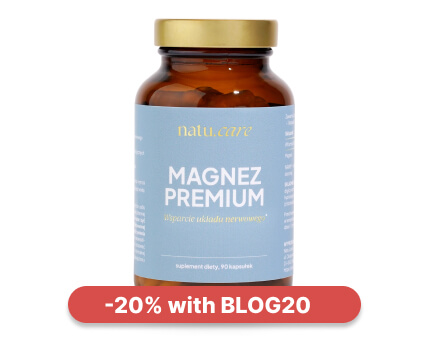
- Magnesium content per day: 305 mg
- Additional active ingredients: Vitamin B6 (2.1 mg)
- Form: capsules
- Serving size: 3 capsules per day
- Sufficient for: 30 days
Product description
The Premium Magnesium + Vitamin B6 dietary supplement is a comprehensive product that combines three organic forms of magnesium (citrate, malate, and diglycinate) and vitamin B6 in highly absorbable forms.
Magnesium is an essential mineral without which our bodies cannot function properly. It supports the immune, nervous, and muscular systems, maintains electrolyte balance, and is involved in cell division and the regulation of mental functions.
Research shows that magnesium supplementation is even more effective when accompanied by vitamin B6, which is included in our product. Vitamin B6 is responsible for the proper functioning of the nervous and immune systems, as well as the proper functioning of the heart.
If you want to safely get rid of feelings of fatigue, concentration problems, hair loss, muscle cramps, trembling, or irritability, reach for Premium Magnesium from Natu.Care, tested by the independent, certified laboratory J.S. Hamilton Poland.
Pros and cons
Pros
- Supports the proper functioning of the nervous and immune systems.
- Reduces feelings of fatigue and tiredness.
- Maintains proper psychological functions.
- The purity of the ingredients (free from anti-caking agents, artificial fillers, and additives such as titanium dioxide, microcrystalline cellulose, talc, magnesium stearate, and silicon dioxide) has been confirmed by laboratory tests.
- High absorption of ingredients.
- Soft capsules that are easy to swallow.
- Suitable for vegetarians and vegans.
Cons
- None.
Additional information
Take with a meal, 3 capsules per day.
The capsules should be taken with at least 250 ml of water.
If you have trouble sleeping, it is advisable to take 1 capsule in the morning and 2 capsules in the evening, no later than 4 hours before bedtime.
Avoid combining with products high in calcium (milk, yogurt, cheese), as this may negatively affect magnesium absorption.
Pregnant and breastfeeding women should consult a doctor before starting supplementation.
User review
I’m very impressed with the speed of delivery. The product itself is of high quality and absorbs well. After two weeks of supplementation, I’ve noticed a significant improvement in muscle recovery, especially during periods of intense training. I highly recommend it!
Product description
The dietary supplement contains omega-3ᵀᴳ, or omega-3 acids in the form of trójglyceridesów. Scientific studies suggest that this form of fatty acidsós up to 2 times better absorbed than the estersós present in many dietary supplements on the market. This means that you are assured of their effectiveness and of supplying yourself with valuable omega acids.
Fatty acids omega-3 are derived from wild anchovy oil. It is a rich source of healthy fats that are essential for the health of the cardiovascular, immune and nervous systems, as well as the proper function of vision, joints muscles.
Scientific research suggests that wild anchovies are a good source of healthy fats.
Scientific research also suggests that an adequate intake of omega-3 fatty acidsós protects against and supports the treatment of depression and anxiety disorders. In addition, omega-3s influence the hydration and appearance of the skinóry and support healthy sleep.
.
The formula contains a total of 750 mg of EPA+DHA acidsós, which is three times higher than the recommended minimum of 250 mg for the Polish population. Omega-3 TG Premium has studies indicating that its TOTOX is 9, which is a very good result.
Supplementation of omega-3 fatty acidsóis recommended for anyone who does not eat 1–2 portions (approximately 300 g) of oily fish per week. Children during growth, seniors, physically active people, vegans and vegetarians, as well as patients undergoing cardiovascular treatment and prevention of heart disease also have an increased need.
Pros and cons
The dietary supplement contains omega-3ᵀᴳ, or omega-3 acids in the form of trójglyceridesów. Scientific studies suggest that this form of fatty acidsós up to 2 times better absorbed than the estersós present in many dietary supplements on the market. This means that you are assured of their effectiveness and of supplying yourself with valuable omega acids.
Fatty acids omega-3 are derived from wild anchovy oil. It is a rich source of healthy fats that are essential for the health of the cardiovascular, immune and nervous systems, as well as the proper function of vision, joints muscles.
Scientific research suggests that wild anchovies are a good source of healthy fats.
Scientific research also suggests that an adequate intake of omega-3 fatty acidsós protects against and supports the treatment of depression and anxiety disorders. In addition, omega-3s influence the hydration and appearance of the skinóry and support healthy sleep.
.
The formula contains a total of 750 mg of EPA+DHA acidsós, which is three times higher than the recommended minimum of 250 mg for the Polish population. Omega-3 TG Premium has studies indicating that its TOTOX is 9, which is a very good result.
Supplementation of omega-3 fatty acidsóis recommended for anyone who does not eat 1–2 portions (approximately 300 g) of oily fish per week. Children during growth, seniors, physically active people, vegans and vegetarians, as well as patients undergoing cardiovascular treatment and prevention of heart disease also have an increased need.
Additional information
The dietary supplement contains omega-3ᵀᴳ, or omega-3 acids in the form of trójglyceridesów. Scientific studies suggest that this form of fatty acidsós up to 2 times better absorbed than the estersós present in many dietary supplements on the market. This means that you are assured of their effectiveness and of supplying yourself with valuable omega acids.
Fatty acids omega-3 are derived from wild anchovy oil. It is a rich source of healthy fats that are essential for the health of the cardiovascular, immune and nervous systems, as well as the proper function of vision, joints muscles.
Scientific research suggests that wild anchovies are a good source of healthy fats.
Scientific research also suggests that an adequate intake of omega-3 fatty acidsós protects against and supports the treatment of depression and anxiety disorders. In addition, omega-3s influence the hydration and appearance of the skinóry and support healthy sleep.
.
The formula contains a total of 750 mg of EPA+DHA acidsós, which is three times higher than the recommended minimum of 250 mg for the Polish population. Omega-3 TG Premium has studies indicating that its TOTOX is 9, which is a very good result.
Supplementation of omega-3 fatty acidsóis recommended for anyone who does not eat 1–2 portions (approximately 300 g) of oily fish per week. Children during growth, seniors, physically active people, vegans and vegetarians, as well as patients undergoing cardiovascular treatment and prevention of heart disease also have an increased need.
Expert opinion
The dietary supplement contains omega-3ᵀᴳ, or omega-3 acids in the form of trójglyceridesów. Scientific studies suggest that this form of fatty acidsós up to 2 times better absorbed than the estersós present in many dietary supplements on the market. This means that you are assured of their effectiveness and of supplying yourself with valuable omega acids.
Fatty acids omega-3 are derived from wild anchovy oil. It is a rich source of healthy fats that are essential for the health of the cardiovascular, immune and nervous systems, as well as the proper function of vision, joints muscles.
Scientific research suggests that wild anchovies are a good source of healthy fats.
Scientific research also suggests that an adequate intake of omega-3 fatty acidsós protects against and supports the treatment of depression and anxiety disorders. In addition, omega-3s influence the hydration and appearance of the skinóry and support healthy sleep.
.
The formula contains a total of 750 mg of EPA+DHA acidsós, which is three times higher than the recommended minimum of 250 mg for the Polish population. Omega-3 TG Premium has studies indicating that its TOTOX is 9, which is a very good result.
Supplementation of omega-3 fatty acidsóis recommended for anyone who does not eat 1–2 portions (approximately 300 g) of oily fish per week. Children during growth, seniors, physically active people, vegans and vegetarians, as well as patients undergoing cardiovascular treatment and prevention of heart disease also have an increased need.
Natu.Care Vitamin D 2000 UI
Product description
Vitamin D plays a crucial role in our health and well-being. It affects calcium and phosphate metabolism, which translates to healthy bones and teeth. It also helps regulate the immune system, and studies indicate its influence on the functioning of the nervous system.
Vitamin D, although called a “vitamin,” is actually a prohormone that our body produces on its own, primarily under the influence of sunlight. Unfortunately, our modern lifestyle contributes to deficiencies of this essential vitamin. Working in enclosed office buildings, using (necessary!) SPF creams, and covering the body with clothing all make it very difficult, if not impossible, to obtain adequate levels of vitamin D from sunlight. This is why appropriate, year-round supplementation is so crucial.
Vitamin D from Natu.Care is a well-tested vitamin D3 suspended in safflower oil, a plant known for its numerous health benefits. The convenient, easy-to-swallow capsule will make supplementation a part of your daily, healthy routine, improving your overall well-being.
Pros and cons
Pros:
- Ensures proper functioning of the immune system
- Supports the maintenance of healthy bones and teeth
- Maintains proper heart, kidney, and muscle function
- Tested by an independent, certified laboratory
- Convenient and easy-to-swallow capsule
- Clean composition - free from added sugar, gluten, GMOs, lactose, and without preservatives or colorants
Cons:
- None.
Additional Information
Pregnant women and breastfeeding mothers should consult a doctor before using the product. This dietary supplement is intended for a healthy adult population up to the age of 75.
Collagen Booster - Glow Stories
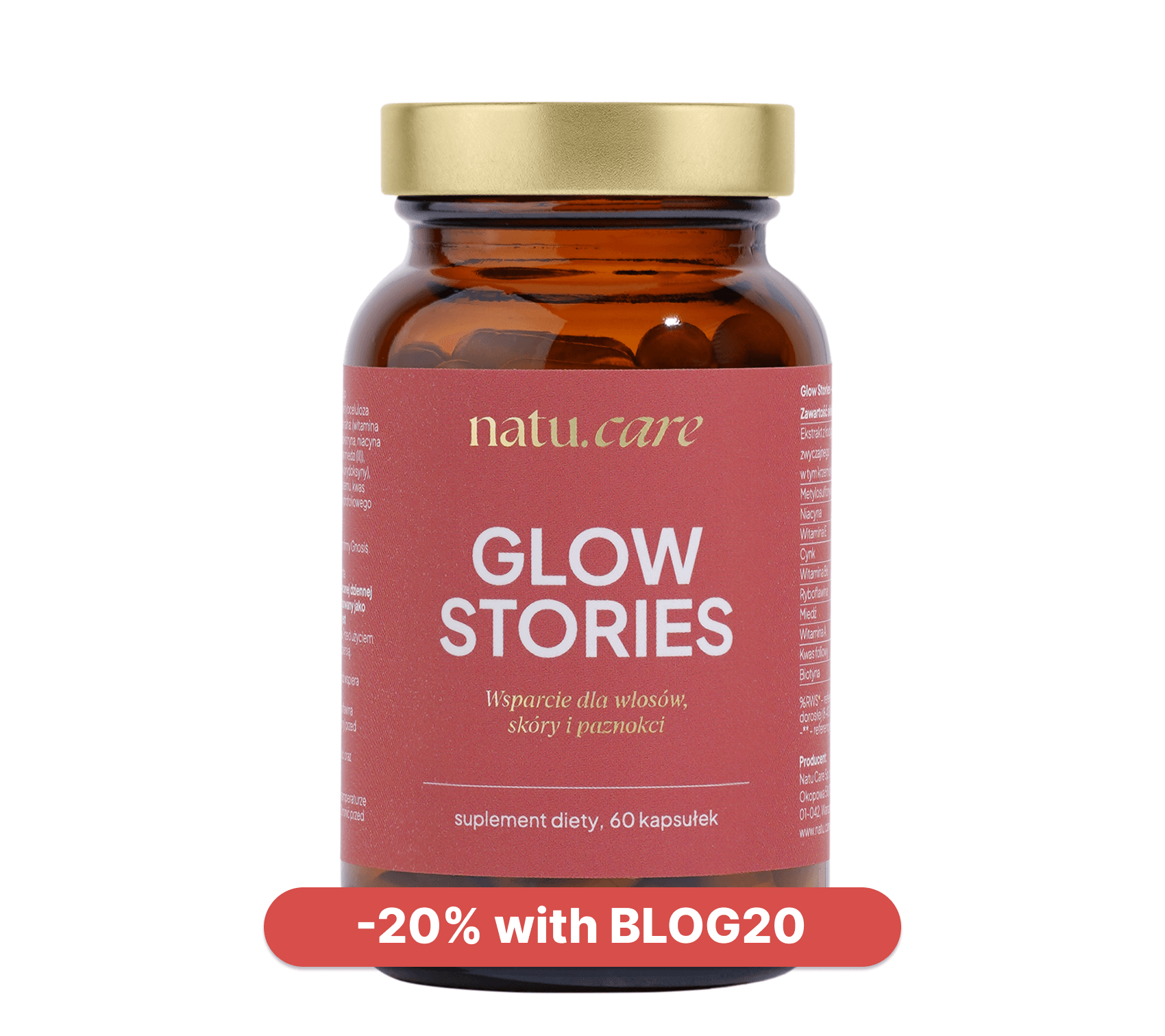
- Active ingredients: bamboo shoot extract, Quatrefolic®, L-Methionine, L-cysteine, vitamin E, vitamin A, niacin (vitamin B3), vitamin B6, vitamin B2 (riboflavin), biotin, zinc, copper
- .
- Form: capsules
- .
- Dose: 1 capsule per day
- .
- Sufficient for: 60 days
- .
Product description
A dietary supplement containing vitamins, minerals and plant extracts thatósupport the skinóhand, hair and nails. The product is especially distinguished by the form of folate – it is Quatrefolic, whichós absorbed very well and is natural.
In addition to valuable vitamins and minerals, such as vitamin A, E, B3, B2 and biotin, the formula contains bamboo shoot extract, whichóry further enhances your beauty.
Pros and cons
A dietary supplement containing vitamins, minerals and plant extracts thatósupport the skinóhand, hair and nails. The product is especially distinguished by the form of folate – it is Quatrefolic, whichós absorbed very well and is natural.
In addition to valuable vitamins and minerals, such as vitamin A, E, B3, B2 and biotin, the formula contains bamboo shoot extract, whichóry further enhances your beauty.
Additional information
A dietary supplement containing vitamins, minerals and plant extracts thatósupport the skinóhand, hair and nails. The product is especially distinguished by the form of folate – it is Quatrefolic, whichós absorbed very well and is natural.
In addition to valuable vitamins and minerals, such as vitamin A, E, B3, B2 and biotin, the formula contains bamboo shoot extract, whichóry further enhances your beauty.
Is caffeine addictive?
.Yes, caffeine is addictive. The criteria caffeinism (caffeine addiction) are described in the Diagnostic and Statistical Manual of Mental Disorders, 5th edition (DSM-V)and.
A person must meet the three necessary and sufficient diagnostic criteria for caffeine use disorder :
.- .
- persistent craving or unsuccessful efforts to reduce or control caffeine use, .
- continued caffeine intake despite knowledge of having a persistent or recurrent physical or psychological problem that was likely caused or exacerbated by caffeine, .
- withdrawal, manifested by a characteristic caffeine withdrawal syndrome; caffeine/closely related substance is taken to alleviate or avoid withdrawal symptoms.
Six additional diagnostic criteria included in other caffeine use disorders, such as hunger, intolerance and taking it in larger amounts or for longer than intended, have also been included as markers of greater severity of the problem of caffeinismand.
A sudden cessation of caffeine consumption causes mild and transient withdrawal symptoms that begin after 12-24 hours of abstinence and peak 20-48 hours later..
 .
.
Ilona Krzak Master of Pharmacy
Symptoms include headache, fatigue, drowsiness, irritability, lowered mood and anxiety. Reactions to caffeine withdrawal vary widely between individuals and are usually not harmful. They are short-lived and self-limiting," adds magister of pharmacy.
Unlike other addictive substances, caffeine does not cause changes in the internal organs. In contrast, the recovery time from this substance lasts about two weeks. If the addiction is severe and the withdrawal attempt causes anxiety and other distressing symptoms, it is worth seeing a psychiatrist.
Tolerance to caffeine
.Regular, long-term consumption of caffeine can lead to changes in brain chemistry. For example, brain cells may start to produce more adenosine receptors to compensate for those blocked by caffeineand.
In turn, more receptors require the consumption of more caffeine to achieve the same effect (e.g. stimulation). Therefore, regular coffee drinkers may build up a tolerance to it over timeand.
Caffeine versus genes
.Proteins (enzymes) in the body metabolise caffeine and there are several gene variants that produce these enzymes. One enzyme, cytochrome P450 1A2, which is responsible for about 95% of caffeine metabolism, is encoded by the CYP1A2 gene. And different variants of this gene cause people to metabolise caffeine faster or slowerand.
Is caffeine harmful?
.Yes, caffeine consumed in excessive amounts (>400 mg/day) is harmful to health. its regular abuse (especially anhydrous caffeine used in dietary supplements) can lead toand:
in some people.- sleep disturbances, .
- increased anxiety, .
- irregular heartbeat, .
- migraine and headache,
- pain.
- muscle tremors,
- high blood pressure,
- high blood pressure.
- high blood pressure, .
Does caffeine leach magnesium?
It depends what we mean by leaching out. It sounds scary, doesn't it? It's as if all the magnesium in your body is about to drain out of you.
Caffeine has a diuretic effect and can flush out magnesium and other valuable components from the bodyand. Increased diuresis can last for about 3 hours after taking. The more caffeine at once, the greater the loss of minerals.
However, here it is worth noting that drinking coffee (a great source of natural caffeine) does not leach magnesium, in fact the opposite - a little black will provide you with itand.
One cup (150 ml) of black coffee can result in a magnesium loss of about 1-2 mg, but will provide you with as much as 10-16 mgand (depending on the type of coffee and water, the brewing method).
Therefore, do not be afraid of coffee, but rather pure caffeine in dietary supplements (e.g. pre-workout or fat burners).
Caffeine content of products
.See below for information on how much caffeine popular drinksand contain approximately.
.160 mg
44.5 mg
|
Product . |
Quantity of caffeine . |
|
| . |
Espresso (30 ml) |
60 mg |
|
Double espresso (60 ml) . |
120 mg |
|
|
Brewed coffee (100 ml) . |
40 mg |
|
|
Decaffeinated brewed coffee (100 ml) . |
0.84 mg |
|
|
Cold brew (100 ml) . |
40-70 mg |
|
|
Soluble coffee (100 ml) |
30 mg |
|
|
Decaffeinated coffee (100 ml) . |
1.6 mg |
|
|
Black tea (200 ml) |
||
| Black tea (200 ml). |
40 mg |
|
|
Green tea (200 ml) . |
35 mg |
|
|
Yerba mate (200 ml) . |
106 mg |
|
|
Matcha (1.5 g powder) . |
65 mg |
|
|
Natural cocoa (2 teaspoons) . |
7 mg
|
|
|
Hot chocolate (200 ml) . |
5 mg |
|
|
Red Bull classic (250 ml) |
80 mg |
|
|
Monster Energy (500 ml) |
||
|
Coca-cola (250 ml) . |
20 mg |
|
|
Pepsi (250 ml) . |
25 mg |
|
|
Bear Energy (250 ml) . |
150 mg |
|
|
Mountain Dew (330 ml) . |
||
|
Bitter chocolate 85% (100 g) . |
80 mg
|
|
|
Dark chocolate 60% (100 g) . |
43 mg |
|
|
Milk chocolate |
20 mg |
In the case of coffee, it is difficult to specify, how much caffeine is realistically in it. The content depends on several factors:
- type of coffee bean, .
- the type of water used .
- type of coffee, .
- roasting stage, .
- portion size, .
Therefore, for health reasons, it is advisable to drink no more than 2-3 cups of coffee per day.
Coffee with milk
Milk does not affect the caffeine content, which is why popular drinks such as cappuccino and latte macchiato have the same amount of caffeine per 100ml as regular coffee.
Caffeine dosage
.Scientific studies indicate that the safe dose of caffeine for healthy adult individuals is a maximum 400 mg per dayand. The dosage depends on your goal (e.g. improving concentration or boosting before a workout) and the measure you are using (e.g. classic coffee, caffeine tablets or powder).
In practice, a healthy caffeine intake looks like this:
.- if you drink coffee, it is usually 4-5 cups or 3-4 mugs of coffee per day, .
- if you drink yerba mate, 30g of dried mate per day is usually sufficient, .
- if you take dietary supplements, absolutely follow the dosage given by the manufacturer. .
Pregnant women should limit their caffeine intake to maximum 300 mg per day. Larger amounts can lead to miscarriageand.
Both to improve concentration and to enhance performance during training, 100 mg of caffeine may be enough for you. Using higher portions is unnecessary, and in some people may cause them to need to add more after time.
Caffeine overdose
.Caffeine overdose occurs when we consume more than 500 mg per day and observe in ourselves symptoms of excess such as increased agitation, arrhythmia, facial flushing, muscle tremors, nervousness, dry mouth, stomach upset and insomniaand
Important
According to the European Food Safety Authority (EFSA), a dose 400 mg of caffeine per day (calculated for a 70 kg adult - approximately 5.7 mg/kg) is not expected to cause long-term negative health side effects . Pregnant women should limit caffeine intake to 200- 300 mg per day .
Caffeine lethal dose
.The single lethal dose of caffeine is 10-14 g (approximately 150-200 mg/kg body weight). At 10 g the first symptoms such as convulsions, vomiting and malaise appearand.
Caffeine begins to affect the body when its blood levels exceed 15 mg/l, so concentrations of 80 to 100 mg/l can be fatal to humans .
Suicide by overdose
.In a review of 2018 scientific journal articles, researchers identified 92 reported caffeine overdose deaths. The researchers believe that about a third of these deaths are likely to be suicidesand.
After what time does caffeine take effect?
.Caffeine begins to act in the body after about 10 minutes, and reaches its maximum concentration within 15-45 minutes of ingestion. The effect of caffeine and the resulting feeling of arousal depends on the source of the caffeine and individual factors such as age, weight or health status, but can last up to 5 hours after consumptionand.
After what time does caffeine disappear from the body?
.The plasma half-life of caffeine can range from 1.5 to as much as 9.5 hours in some people . This means that during this time its concentration in the blood is reduced by half. So, if you calculate correctly, it must take up to a dozen hours for this substance to disappear from the body.
Tip
To get rid of caffeine from your body faster, drink plenty of water.
Caffeine for children
.According to the European Food Safety Authority (EFSA), children should not consume more 2.5 mg of caffeine per kilogram of body weightand. That is, for example, the average first-grader can consume a maximum of 75 mg of caffeine per day.
Unfortunately, there are no official guidelines for Poland, so I will use those provided by the Ministry of Health in Canada . Experts suggest maximum caffeine intake for children and adolescents:
.|
Age . |
Maximum daily dose of caffeine . |
|
| . |
Under 4 years |
It is not recommended to take caffeine in any form . |
|
4-6 years |
45 mg |
|
|
7-9 years |
62.5 mg |
|
|
10-12 years |
85 mg |
|
|
From 13 years |
Up to 2.5 mg/kg body weight |
The American Academy of Pediatrics (AAP) in general does not recommend caffeine consumption by children and adolescents, due to its potentially harmful effectsand.
The US case
.In 2017, a South Carolina teenager died after drinking a latte from McDonald's, a large Mountain Dew soda and a high-caffeine energy drink . According to the coroner, the mixture of drinks led to a "caffeine-induced cardiac event, causing a probable arrhythmia".
Energy Act 2024
.From 1 January 2024, legislation came into force in Poland banning the sale of energy drinks to people under the age of 18.
The Energy Drinks Act 2024
is a new law.Important
The legislator has defined that an energy drink is a beverage with added caffeine or taurine, which contains caffeine in a proportion exceeding 150 mg/l or taurine, excluding naturally occurring substances.
In the explanatory memorandum of the draft, its authors stressed that it was a response to an alarming report by the National Institute of Public Health - National Research Institute.
It shows that the consumption energol among children is:
- 2.1% in children aged 3-9 years, .
- 35.7% in children aged 10-17 years (including 35.7% of boys and 27.4% of girls).
European data from 16 countries also raise blood pressure (even better than caffeine):
- About 19% of surveyed children aged 6-10 years and 2% of children aged 3-5 years have consumed energy drinks in the past year.
- The following are some of the results of the study.
- Children aged 3-10 years who drink energy drinks consumed an average of 0.49 litres of them per week.
- The average amount of energy drinks consumed by children aged 3-10 years was 0.49 litres per week.
- 16% of children aged 3-10 years declared that they drink an energy drink 3-5 times a week, and around 6% of those surveyed said that they consume them almost every day.
- The highest proportion of children consuming energy drinks was found in the UK (24%), Spain (26%) and the Czech Republic (40%).
- Among the children surveyed, the least energy drinkers were in Hungary (6%), Belgium (8%), and Austria (9%). In Poland it was 12%. .
- As many as 60% of children and adolescents indicated that they drink them for taste and 31% see them as a source of energy.
And manufacturers are doing their bit...
.Drinks containing 14 mg/100 ml of caffeine are already sold in the Żabka chain of shops, which is exactly 1 mg/100 ml less than the drinks you have to show your ID card to buy.
Note that taurine or caffeine is not only found in Monster or coffee. This compound is also found in sweets - especially look out for candy bars.
Caffeine in pregnancy
.A healthy pregnant woman can take up to 300 mg of caffeine per dayand. It is important to note that caffeine can easily cross the placenta, which can increase the risk of miscarriage or low birth weight babies, so mothers-to-be should limit their intake.
Some women find it difficult to give up coffee, so a decaffeinated option may be chosen. Such coffee contains minimal amounts of caffeine, but retains other valuable antioxidants that benefit health.
A significant correlation has been observed between excessive caffeine consumption during pregnancy and reduced intelligence quotient in children. This supports current guidelines not to exceed 200-300 mg of caffeine per day..
 .
.
Ilona Krzak Master of Pharmacy
Side effects of caffeine use
.Excess caffeine (consumption of more than 400 mg per day) can cause side effects such asand:
in some people.- .
- anxiety, mood disorders, .
- concentration problems .
- increased agitation, .
- arrhythmia, .
- facial flushing, .
- muscular tremor, dry mouth, .
- gastrointestinal distress, .
- insomnia, .
Symptoms can be particularly dangerous for people with heart disease. If you are experiencing any of the above symptoms, see your doctor.
There are a number of things you should do.
What not to combine caffeine with?
.Caffeine should not be combined with certain medications, dietary supplements and plantsand.
.|
Substance combination . |
Effects . |
|
|
Synephrine + caffeine |
Some scientific studies suggest that the use of this combination (especially in high doses) may exacerbate agitation and disrupt heart function. |
Synephrine + caffeine is a powerful stimulant for the heart. |
|
Alcohol + caffeine |
Caffeine speeds up the metabolism of alcohol, blocks the feeling of intoxication and can lead to excessive consumption of alcoholic beverages. The drinker does not feel that he has taken it, but the adverse effects of high amounts of alcohol come later. |
|
|
Some drugs + caffeine . |
If you are on chronic medication, ask your doctor if you can use caffeine. Watch out for some combinations of caffeine with:
|
Caffeine under eyes
.Cosmetics with caffeine can improve the appearance of your complexion - it's a great antioxidant, and will be especially good under fatigued eyes. This compound has excellent drainage properties, meaning it stimulates skin microcirculation.
Cosmetologist Marta Kalbarczyk scores caffeine:
.- .
- Improves microcirculation, which contributes to the reduction of puffiness and dark circles under the eyes. .
- Prevents the dilatation of blood vessels, which is especially important for vascular or erythema-prone complexions.
- Has an anti-inflammatory effect on the skin.
- Has an anti-inflammatory effect, which has a positive impact on the alleviation of irritation. .
Caffeine has the ability to penetrate the layers of the epidermis, but mainly has a surface action. This has the effect of reducing swelling, improving blood circulation and supporting the condition of the skin, especially in the area around the eyes..
 .
.
Marta Kalbarczykcosmetologist
Magister of Pharmacy Ilona Krzak adds: Commercially available topical caffeine preparations usually contain a concentration of 3% caffeine. For cosmetic purposes, caffeine is used as an active ingredient in anti-cellulite products; it prevents excessive fat accumulation in cells.
See also:
Summary
.- Caffeine is an organic chemical compound from the alkaloid group that is found in coffee and cocoa beans, kola nuts and tea leaves, among others.
- Caffeine is an organic chemical compound from the alkaloid group that is found in coffee and cocoa beans, kola nuts and tea leaves.
- It is classified as a stimulant because it has a stimulating effect on the central nervous system. .
- Caffeine anhydrous is the pure, concentrated form of caffeine present in medicines and dietary supplements.
- Caffeine anhydrous is the pure, concentrated form of caffeine present in medicines and dietary supplements.
- Caffeine is absorbed in the body within 45 minutes, with blood levels reaching their highest concentration within 15-45 minutes of ingestion.
- The half-life depends on individual factors, but can be as long as 9.5 hours. This means that in some people, caffeine will not disappear from the body until 19 hours later.
- It is not recommended to use more than 400 mg of caffeine per day. .
- Caffeine stimulates, improves reflexes, concentration, raises metabolism, increases strength and performance, and supports the cardiovascular system.
- Symptoms of overdose occur after the ingestion of approximately 500 mg of caffeine. .
- The single lethal dose of caffeine is 10-14 g (approx. 150-200 mg/kg body weight).
- The following is an example.
- It is better to choose natural sources of caffeine such as coffee, yerba, tea, rather than dietary supplements with caffeine. .
- Caffeine is a popular ingredient in anti-ageing cosmetics, stimulating microcirculation and reducing swelling. .
FAQ
.What is the best caffeine?
.The best caffeine is that of natural origin: from coffee, tea, yerba or matcha. In addition to the stimulating caffeine, these products contain numerous bioactive ingredients and antioxidants that benefit health.
If, however, you don't like these drinks and prefer dietary supplements with caffeine in tablets, capsules or powder, choose products whose manufacturer performs laboratory testing to confirm the purity and quality of the ingredients. Unfortunately, many supplements (so-called burners and pre-workouts) are contaminated or contain higher amounts of active ingredients.
Does caffeine raise blood pressure?
.Caffeine raises blood pressure by 4-5 mmHg for systolic pressure and 8-10 mmHg for diastolic pressure. Caffeine raises blood pressure in the short term. Interestingly, however, in people who consume it regularly, this effect may not occur.
Caffeine versus theine - what are the differences?
.Caffeine and theine are chemically the same substance, but the source differs - caffeine is the compound present in coffee, while theine is the caffeine found in tea. Interestingly, the caffeine in yerba mate is matein, while that from guarana is guaranine.
Does matcha contain caffeine?
.Yes, matcha contains caffeine. There are 65 mg of caffeine in a serving of 1.5 g of powder (teaspoon), but the content may vary depending on the quality of the powder or the method of preparation.
Is caffeine in tablets healthy?
.Caffeine in tablets can benefit mood, workout readiness or promote fat loss. However, it should be used in moderation (maximum 400 mg per day) and instead of tablets (capsules) choose natural sources that also provide other valuable bioactive ingredients.
Does caffeine cross into breast milk?
Yes, caffeine crosses into breast milk at a rate of approximately 1% of a woman's caffeine intake. Therefore, it is not recommended to consume caffeine during lactation. Some breastfed babies may react badly (e.g. abdominal pain, irritability, crying). The breastfeeding mother can then replace, for example, regular coffee with decaffeinated or cereal coffee.
Guarana versus caffeine, what are the differences?
.Guarana and caffeine differ in source, effect, caffeine content and additional active ingredients.
- Origin: Caffeine is a chemical compound found in coffee beans, tea and cocoa, among others. Guarana is a plant native to the Amazon whose seeds are particularly rich in caffeine.
- Guarana is a plant native to the Amazon whose seeds are particularly rich in caffeine.
- Caffeine content: Guarana has one of the highest caffeine contents among plants - up to four times more than coffee beans.
- Additional ingredients: Both contain caffeine, but guarana, in addition to caffeine, also has theobromine and theophylline - chemical compounds with similar effects to caffeine.
- Effects on the body: Guarana caffeine is released more slowly into the body, making its effects long-lasting but less intense compared to standard caffeine.
What does Cardiamide with caffeine work for?
.Cardiamid with caffeine is a liquid dietary supplement (100 ml bottle) containing caffeine, vitamin B6 and plant extracts from hawthorn fruit, ginseng root and guarana seeds. These ingredients help the body to reduce feelings of fatigue and tiredness. The price of the preparation ranges from PLN 20 to PLN 30.
.What plants give you energy?
.If you want to give yourself a natural energy boost, check out how plants (in the form of teas or supplements) will work for you: ashwagandha (Indian ginseng), rhodiola rosea, maca root, cordyceps (macca).
Sources
.See all
.Acheson, K. J., Zahorska-Markiewicz, B., Pittet, P., Anantharaman, K., & Jéquier, E. Caffeine and coffee: Their influence on metabolic rate and substrate utilization in normal weight and obese individuals. The American Journal of Clinical Nutrition, 33(5) 1980, 989-997. https://doi.org/10.1093/ajcn/33.5.989
Cappelletti, S., Daria, P., Sani, G., & Aromatario, M. (2015). Caffeine: Cognitive and Physical Performance Enhancer or Psychoactive Drug? Current Neuropharmacology, 13(1), 71-88. https://doi.org/10.2174/1570159X13666141210215655
Carman, A. J., Dacks, P. A., Lane, R. F., Shineman, D. W., & Fillit, H. M. (2014). Current evidence for the use of coffee and caffeine to prevent age-related cognitive decline and Alzheimer's disease. The Journal of Nutrition, Health & Aging, 18(4), 383-392. https://doi.org/10.1007/s12603-014-0021-7
Chen, C.-H., Wu, S.-H., Shiu, Y.-J., Yu, S.-Y., & Chiu, C.-H. (2023). Acute enhancement of Romanian deadlift performance after consumption of caffeinated chewing gum. Scientific Reports, 13(1), Article 1. https://doi.org/10.1038/s41598-023-49453-y
Correa, M., SanMiguel, N., López-Cruz, L., Carratalá-Ros, C., Olivares-García, R., & Salamone, J. D. (2018). Caffeine Modulates Food Intake Depending on the Context That Gives Access to Food: Comparison With Dopamine Depletion. Frontiers in Psychiatry, 9. https://www.frontiersin.org/articles/10.3389/fpsyt.2018.00411
Diel, P. (2020). Caffeine and Doping-What Have We Learned since 2004. Nutrients, 12(8). https://doi.org/10.3390/nu12082167
Doherty, M., & Smith, P. M. (2005). Effects of caffeine ingestion on ratings of perceived exertion during and after exercise: A meta-analysis. Scandinavian Journal of Medicine & Science in Sports, 15(2), 69-78. https://doi.org/10.1111/j.1600-0838.2005.00445.x
Escohotado, A. (1999). A Brief History of Drugs: From the Stone Age to the Stoned Age. Inner Traditions/Bear.
Evans, J., Richards, J. R., & Battisti, A. S. (2023). Caffeine. In StatPearls. StatPearls Publishing. http://www.ncbi.nlm.nih.gov/books/NBK519490/
.Flaten, V., Laurent, C., Coelho, J. E., Sandau, U., Batalha, V. L., Burnouf, S., Hamdane, M., Humez, S., Boison, D., Lopes, L. V., Buée, L., & Blum, D. (2014). From epidemiology to pathophysiology: What about caffeine in Alzheimer's disease? Biochemical Society transactions, 42(2), 587-592. https://doi.org/10.1042/BST20130229
Greenberg, J. A., & Geliebter, A. (2012). Coffee, hunger, and peptide YY. Journal of the American College of Nutrition, 31(3), 160-166. https://doi.org/10.1080/07315724.2012.10720023
Grosso, G., Micek, A., Castellano, S., Pajak, A., & Galvano, F. (2016). Coffee, tea, caffeine and risk of depression: A systematic review and dose-response meta-analysis of observational studies. Molecular Nutrition & Food Research, 60(1), 223-234. https://doi.org/10.1002/mnfr.201500620
Heckman, M. A., Weil, J., & De Mejia, E. G. (2010). Caffeine (1, 3, 7-trimethylxanthine) in Foods: A Comprehensive Review on Consumption, Functionality, Safety, and Regulatory Matters. Journal of Food Science, 75(3), R77-R87. https://doi.org/10.1111/j.1750-3841.2010.01561.x
Hesselberg, T., & Vollrath, F. (2004). The effects of neurotoxins on web-geometry and web-building behaviour in Araneus diadematus Cl. Physiology & Behavior, 82(2-3), 519-529. https://doi.org/10.1016/j.physbeh.2004.04.058
Jiang, X., Zhang, D., & Jiang, W. (2014). Coffee and caffeine intake and incidence of type 2 diabetes mellitus: A meta-analysis of prospective studies. European Journal of Nutrition, 53(1), 25-38. https://doi.org/10.1007/s00394-013-0603-x
Koot, P., & Deurenberg, P. Comparison of changes in energy expenditure and body temperatures after caffeine consumption. Annals of Nutrition & Metabolism, 39(3) 1995, 135-142. https://doi.org/10.1159/000177854
Lin, Y.-S., Weibel, J., Landolt, H.-P., Santini, F., Meyer, M., Brunmair, J., Meier-Menches, S. M., Gerner, C., Borgwardt, S., Cajochen, C., & Reichert, C. (2021). Daily Caffeine Intake Induces Concentration-Dependent Medial Temporal Plasticity in Humans: A Multimodal Double-Blind Randomized Controlled Trial. Cerebral Cortex (New York, N.Y.: 1991), 31(6), 3096-3106. https://doi.org/10.1093/cercor/bhab005
Martin, J. B., Annegers, J. F., Curb, J. D., Heyden, S., Howson, C., Lee, E. S., & Lee, M. (1988). Mortality patterns among hypertensives by reported level of caffeine consumption. Preventive Medicine, 17(3), 310-320. https://doi.org/10.1016/0091-7435(88)90006-0
Nehlig, A. (2016). Effects of coffee/caffeine on brain health and disease: What should I tell my patients? Practical Neurology, 16(2), 89-95. https://doi.org/10.1136/practneurol-2015-001162
Nowczewska, M., Wicinski, M., & Kazmierczak, W. (2020). The Ambiguous Role of Caffeine in Migraine Headache: From Trigger to Treatment. Nutrients, 12(8), 2259. https://doi.org/10.3390/nu12082259
Nutrition, C. for F. S. and A. (2023). Pure and Highly Concentrated Caffeine. FDA. https://www.fda.gov/food/dietary-supplement-ingredient-directory/pure-and-highly-concentrated-caffeine
Research, I. of M. (US) C. on M. N., & Marriott, B. M. (1994). Effects of Caffeine on Cognitive Performance, Mood, and Alertness in Sleep-Deprived Humans. In Food Components to Enhance Performance: An Evaluation of Potential Performance-Enhancing Food Components for Operational Rations. National Academies Press (US). https://www.ncbi.nlm.nih.gov/books/NBK209050/
Research, I. of M. (US) C. on M. N. (2001). Pharmacology of Caffeine. In Caffeine for the Sustainment of Mental Task Performance: Formulations for Military Operations. National Academies Press (US). https://www.ncbi.nlm.nih.gov/books/NBK223808/
Schubert, M. M., Irwin, C., Seay, R. F., Clarke, H. E., Allegro, D., & Desbrow, B. (2017). Caffeine, coffee, and appetite control: A review. International Journal of Food Sciences and Nutrition, 68(8), 901-912. https://doi.org/10.1080/09637486.2017.1320537
Wu, J., Ho, S. C., Zhou, C., Ling, W., Chen, W., Wang, C., & Chen, Y. (2009). Coffee consumption and risk of coronary heart diseases: A meta-analysis of 21 prospective cohort studies. International Journal of Cardiology, 137(3), 216-225. https://doi.org/10.1016/j.ijcard.2008.06.051
Editorials
Meet the team

Ilona Krzak obtained her Master of Pharmacy degree from the Medical University of Wrocław. She did her internship in a hospital pharmacy and in the pharmaceutical industry. She is currently working in the profession and also runs an educational profile on Instagram: @pani_z_apteki

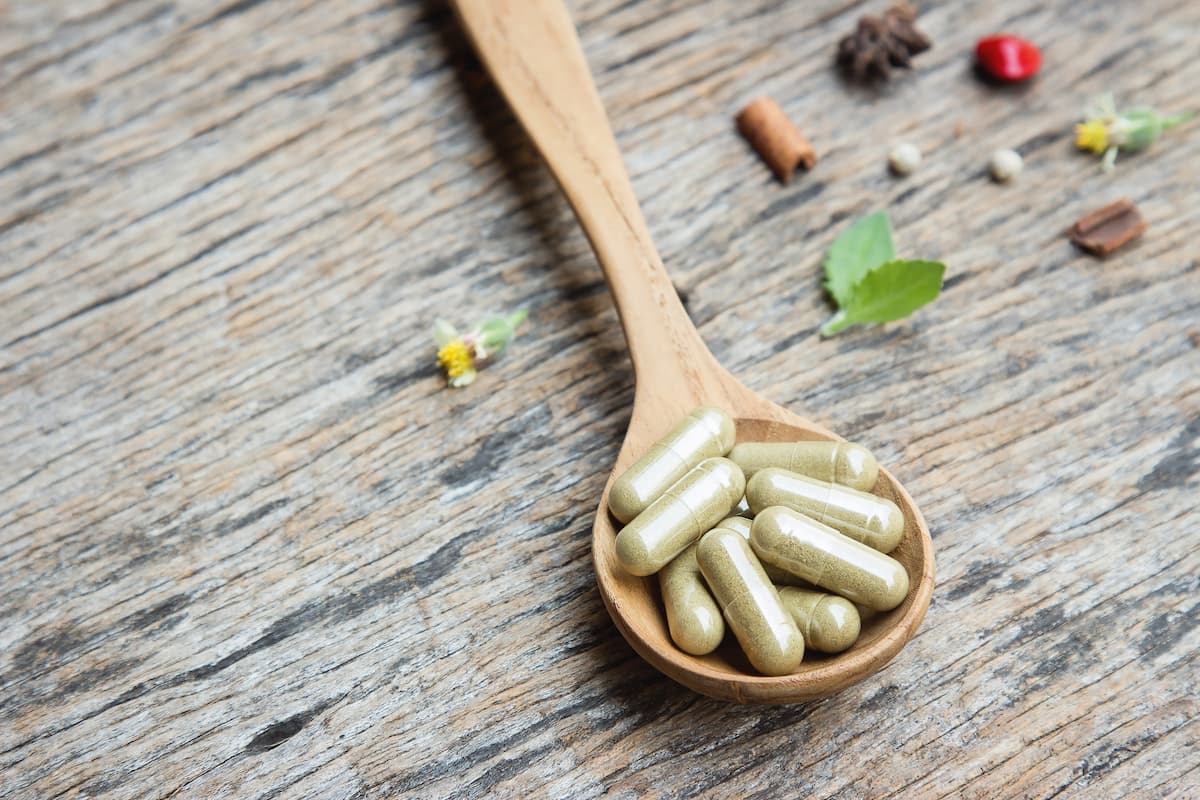
Ashwagandha affects thyroid hormone levels. Find out if you can use it.
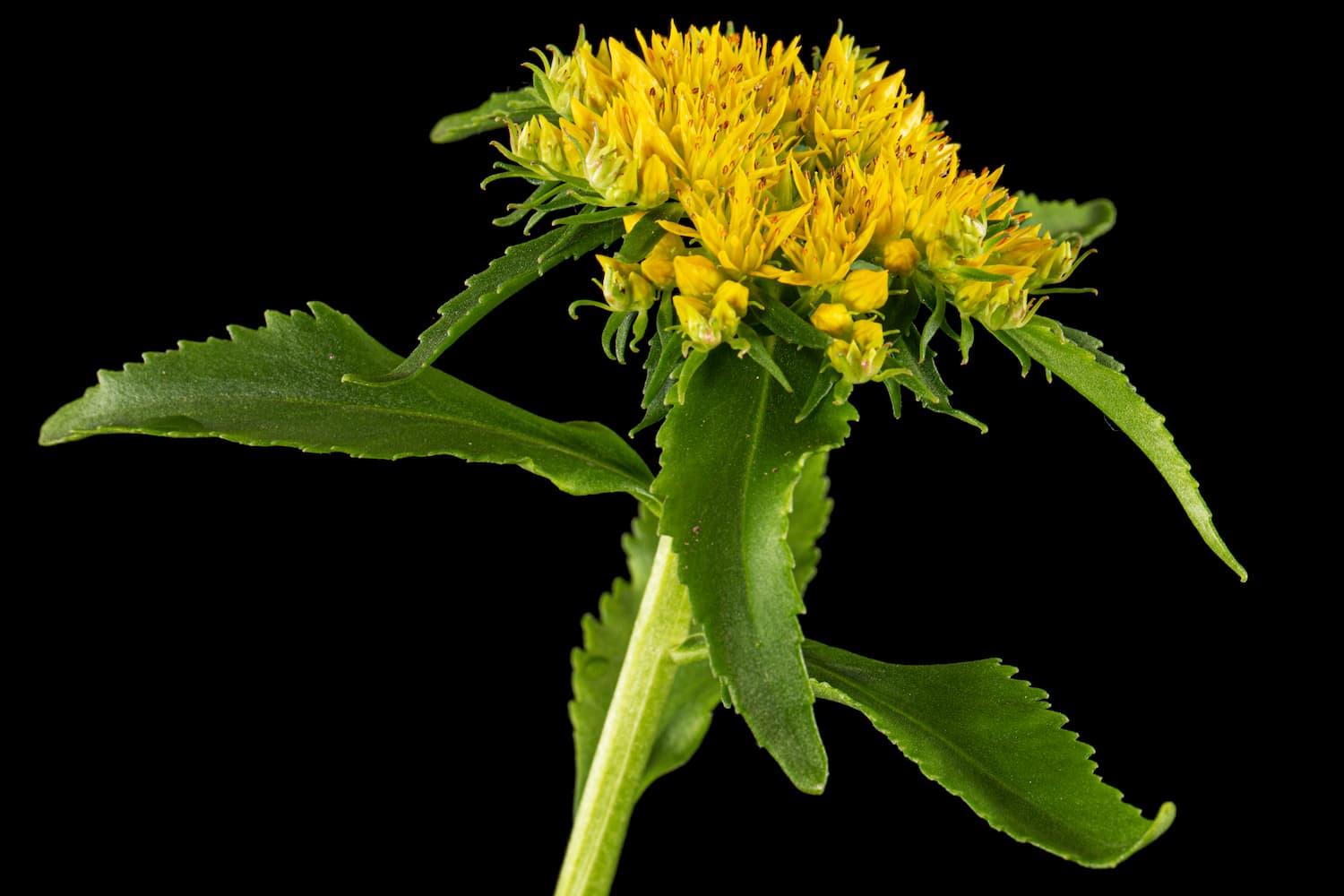
See how mountain pintail can affect your wellbeing.

Check out the opinions of doctors and other professionals about ashwagandha. Also find out what people on the forum think about it.
